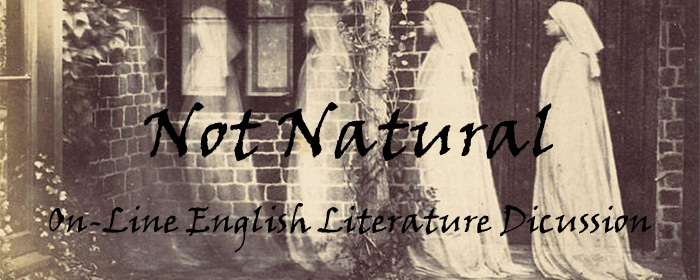
Folklore. Fairy-tales. Horror stories. Urban legends. Mythology. What is it about the inexplicable, the fantastical, and the outrageously unrealistic that captures the human imagination? For that matter, what is it about the human imagination that causes it to manufacture these things, if indeed there is no outside originator?
It was while studying “The Old Nurse’s Story” by Elizabeth Gaskell that our English professor posed a question concerning the variety and ongoing popularity of the “supernatural” in entertainment. Why do humans continue to be fascinated by the supernatural? It is ubiquitous throughout literary history, and while realism began to rise during the nineteenth century, fantastical supernatural elements have never been fully expunged from literature. In fact, possibly in opposition to that threat of realism, throughout the late 19th-20th centuries “fantasy” as a genre emerged, along with its counterparts science-fiction and horror. That is how I framed part of my response:
I think the supernatural/fantasy worlds have always been to a certain extent an escape from reality. While supernatural stories throw light (or maybe more shade) on those aspects of life that we don’t understand and can’t explain, as has been mentioned, it also serves as an outlet for the overflowing of human imagination and a release from being trapped in the physical world.
14 February 2017
While Gaskell is probably better known for her novels with more realistic subjects and treatment, “The Old Nurse’s Story” is a chilling ghost-tale: isolated settings, an orphaned child, tight-lipped domestics, a forbidden west wing, and music emanating from a broken pipe-organ. It also explores love, betrayal, revenge, and forgiveness, all very familiar human experiences. Gothic fiction (while it spans a great variety of texts, some more macabre than others) is largely to do with the supernatural and psychologically thrilling, and it was in the 19th century revival of Gothicism that “The Old Nurse’s Story” was written. If you haven’t read it, I would highly recommend it. If you’re looking for a temporary escape, immerse yourself in the atmosphere of this story. It is easily read in one sitting, and, as Edgar Allen Poe would have it, is best appreciated that way.
Fantasy developed from mythology, codified by Tolkien in the 20th century. While it is not as directly filed under the heading “supernatural” as Gothic fiction is, fantasy shares with it much of the same motivation and effect. I identified this connection by quoting Tolkien:
In his essay “On Fairy Stories,” J.R.R. Tolkien writes in defence of this mode of escape: “I have claimed that Escape is one of the main functions of fairy-stories, and since I do not disapprove of them, it is plain that I do not accept the tone of scorn or pity with which ‘Escape’ is now so often used: a tone for which the uses of the word outside literary criticism give no warrant at all. In what misusers are fond of calling Real Life, escape is evidently as a rule very practical, and may even be heroic…Why should a man be scorned if, finding himself in prison, he tries to get out and go home? Or if, when he cannot do so, he thinks and talks about other topics than jailers and prison-walls?…In using escape in this way the critics have chosen the wrong word, and what is more, they are confusing, not always by sincere error, the Escape of the Prisoner with the Flight of the Deserter.”
The supernatural and fantastical in literature come from the human understanding that there is more outside the prison walls, and is our attempt to engineer or recreate it to make our sentence more bearable.
14 February 2017
